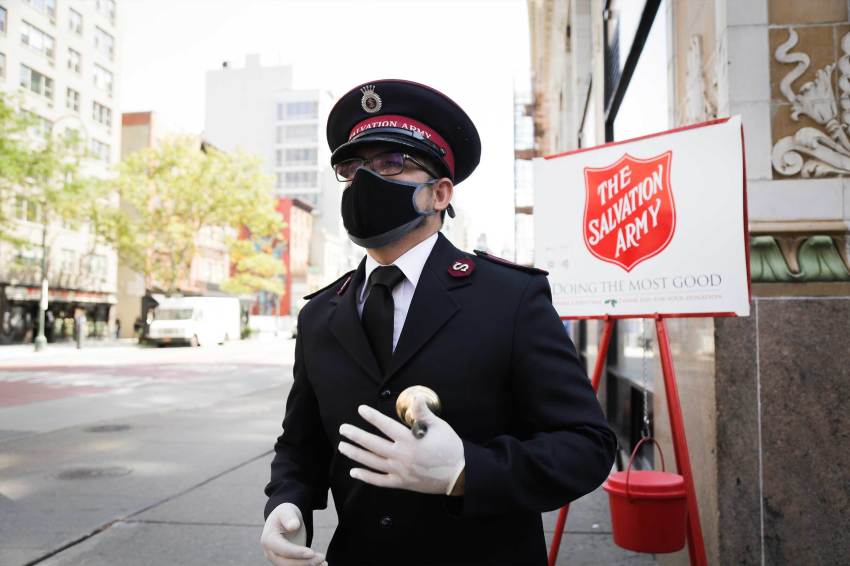More Americans view Salvation Army unfavorably after racial discussion guide controversy, poll finds

The Salvation Army’s publishing of a “Let’s Talk About Racism” discussion guide has taken a toll on its perception among Americans and potential donors, the results of a new poll suggest.
A survey of 1,200 registered voters conducted by Rasmussen Reports and RMG Research on behalf of the advocacy group Color Us United asked voters about their perception of the Salvation Army after learning that the Christian charity published a document called “Let’s Talk About Racism.”
The Salvation Army is one of the most well-known Christian charities globally and pulled the document after blowback. “Let’s Talk About Racism” was once billed by the charity as “a resource guide developed to guide The Salvation Army family in gracious discussions about overcoming the damage racism has inflicted upon our world.”
The document described itself as a “voluntary discussion guide” provided through the “International Social Justice Commission.” The guide was not intended to stand as a “position or policy statement.”
Critics of the document, including Color Us United, “a national campaign to advocate for a raceblind America,” alleged that the guide promoted the controversial topic of critical race theory. The resource listed works by proponents of the controversial framework as recommended readings.
The Rasmussen survey, which questioned respondents between Dec. 6 and Dec. 8, also asked respondents for their views on the Salvation Army before informing them of the “Let’s Talk About Racism” document.
Eighty-one percent of respondents had either a “very favorable” or “somewhat favorable” view of the Salvation Army before learning about the “Let’s Talk About Racism” initiative.
In contrast, just 11% had a “somewhat unfavorable” or “very unfavorable” opinion of the charity.
Respondents were then told that “[t]his year, the Salvation Army’s training materials ask their white members to consider repenting for the ‘sin’ of racism” and that “[t]he charity’s new Diversity, Equity, and Inclusion program presents the view that America is a structurally racist society.” The survey asked respondents if they were “more or less likely to donate to the Salvation Army” after learning that information.
Upon learning about “Let’s Talk About Racism,” 32% of those surveyed said that they were either “much less likely” or “somewhat less likely” to donate to the Salvation Army. An additional 32% stated that they were “much more likely” or “somewhat more likely” to donate to the charity.
Twenty-eight percent maintained that the “Let’s Talk About Racism” initiative would have no impact on whether they would contribute to the Salvation Army.
The poll asked respondents to re-evaluate their opinion of the charity “knowing that the Salvation Army is training members in the belief that America is a structurally racist society.”
The share of voters who viewed the Salvation Army as “very favorable” or “somewhat favorable” dropped from 81% to 41%. The percentage of respondents who had a “somewhat unfavorable” or “very unfavorable” view of the Salvation Army increased to 41% from 11%.
Color Us United created a petition opposing “the insertion of politically charged racial ideologies into The Salvation Army’s good work.”
As of Wednesday morning, the petition gathered 16,800 signatures out of a goal of 25,000. The petition called for a revocation of the “Let’s Talk About Racism” guide.
The Salvation Army issued a statement last week declaring that “[e]lements of the recently issued ‘Let’s Talk About Racism’ guide led some to believe we think they should apologize for the color of their skin, or that The Salvation Army may have abandoned its Biblical beliefs for another philosophy or ideology.”
The charity indicated “that was never our intention” and removed the guide for “appropriate review.”
Color Us United contends that the Salvation Army needs to go further and explicitly denounce critical race theory by formally proclaiming that “America is not a racist country.”
While Salvation Army Commissioner Kenneth Hodder assured donors in a short video that the organization endorses “no social theory or philosophy” and “never will,” Color Us United President Kenny Xu pushed back on that assertion in a statement to media outlets Tuesday.
“Salvation Army says we’re not going to stand on a political side; we’re neither left nor right, etc., etc.,” Xu said. “This is not a political statement. In fact, this is the least political statement you could possibly make. The previous statement you made was political.”
Xu described aspects of the “Let’s Talk About Racism” curriculum as “a political statement.”
“For you to actually say that you’re not going to be political means that you need to actually say a statement reversing what you originally said,” Xu believes.
Color Us United started a digital campaign asking the Salvation Army to #JustSayIt and denounce the central idea of critical race theory. The campaign is targeting “anybody who likes the page Salvation Army.”
In an interview with CBN News, Hodder explained that because “that document was causing confusion amongst our people and externally,” “we’ll put something up in the future that is closely aligned with that mission statement that I referred to earlier.”
Specifically, Hodder characterized the mission of the Salvation Army as preaching “the Gospel of Jesus Christ and meet human needs in His name without discrimination.”
Noting that the Christmas season “is a season of forgiveness and generosity,” Xu told the Salvation Army, “if you’re going to win back your donors, you must do it now.”
“You must do it before Christmas, during this holiday season because that will be an example to … so many other organizations in the country that dare tread the waters of wokeness,” he added.
Xu alleged that in addition to donors, local chapters of the Salvation Army oppose the “Let’s Talk About Racism” campaign. The activist recalled a conversation he had with a Delaware-based Salvation Army officer on the radio who remarked that “local chapters don’t really … believe in this stuff.”
Ryan Foley is a reporter for The Christian Post. He can be reached at: ryan.foley@christianpost.com



























